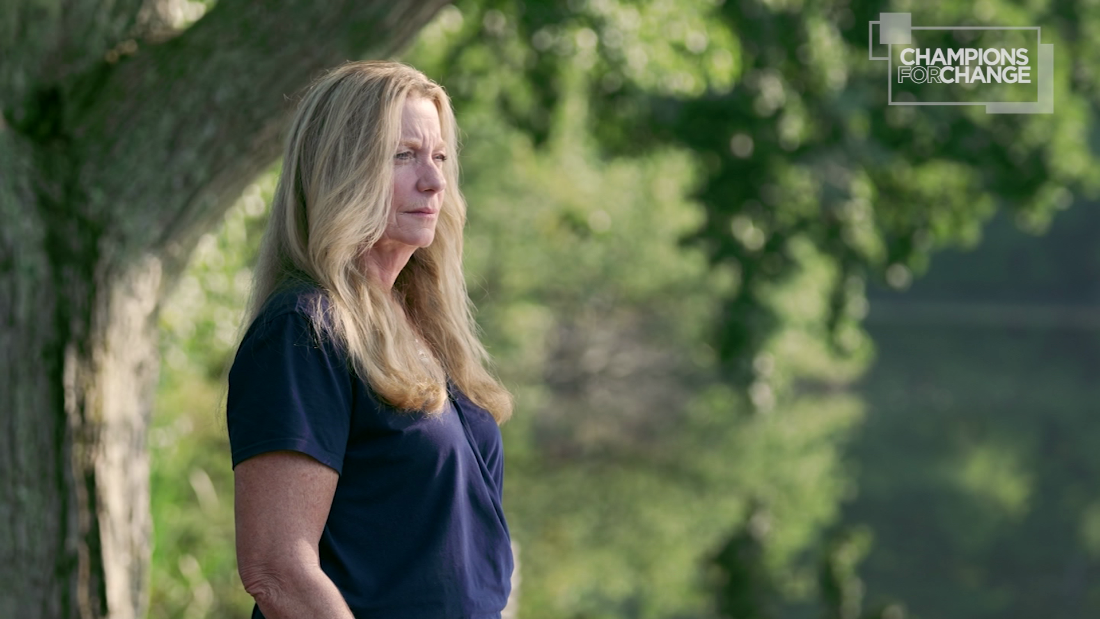Why did addictions increase during the pandemic?
4:39
(CNN) -
Joanne Peterson was present at the State of the Union address and addressed governors across the country to discuss the opioid epidemic.
Senators and attorneys general are calling you in hopes of better understanding how they can support their communities as they face an overdose epidemic.
It's an incredibly rewarding job, but when I visited her recently in Taunton, Massachusetts, she told me that she would forgo all credit for not having to go through the pain that addiction left in her family. "I would change everything for not having ... been through this."
Peterson's mission is to help the families of people who suffer from addiction. Although it is understandable that so much attention is paid to the individual with substance use disorder, Peterson realized that suffering is limitless, because she was a member of one of those families. She says her brother used cocaine to deal with his depression and that her niece died of a fentanyl overdose. On each occasion, Peterson felt the personal pain of watching a loved one suffer, and the silence that too often followed because of the stigma surrounding addiction.
From his own experience, Peterson founded Learn to Cope in 2004. At first, it was simply a safe place for a few strangers with a common pain, invisible to the rest of society, gathered.
Now, it is a national organization with 11,000 members and growing, offering support to the families of those with loved ones who suffer from drug and alcohol addiction.
Why did addictions increase during the pandemic?
4:39
Addictions, an epidemic of stigma
Stigma can manifest itself in all kinds of ways.
Peterson recalls driving with his mother as a young man to visit his brother at different rehabilitation centers, with the warning that the story should be kept secret.
He told me that his brother practically disappeared from their lives, since "they went to big family gatherings and his name was never mentioned, or people were afraid to ask about him."
She says mental health was never discussed, much less substance abuse.
"In the 70s there was not much help. Nobody used the words 'mental health'. It was more like 'that person is crazy', or 'that person is a loser' or 'a drug addict'".
advertising
"I could never understand why people did not understand that that person is a human being who is suffering, and that person is loved. That is my brother, that is my sister," he said.
After attending a community meeting on drug overdose in 2004, Peterson recognized other families experiencing the same trauma.
"I remember seeing some mothers and fathers, and one of them was really crying. And I thought, 'This is me.' You know?"
It was at this time that Learn to Cope was born.
Peterson says having the support and understanding of people going through the same experience is vital.
Very few people understand the impact this disease can have on those around them.
Peterson told me the story of a mother who contacted her because her son was struggling with heroin after he was stopped on OxyContin to control cancer pain.
"She told me she missed him having cancer. She said, 'You know why? Because everyone loved him then. Now no one gives anything for him.'
The pandemic has made Learn to Cope's work even more crucial.
"We've lost even more (people)," Petersen said.
"A lot of people in long-term recovery who were doing very well, had rebuilt their lives, had good jobs, maybe even a house, a career, they are relapsing from the loss of a job, from not being able to pay (their houses)."
Overdose deaths in 2020 hit the highest number ever recorded, according to CDC data
The brutal statistics confirm it.
The overdose epidemic in the United States is the worst in its history.
The most recent figures from the U.S. Centers for Disease Control and Prevention (CDC) recorded more than 93,000 overdose deaths in 2020, the highest number ever.
The factors driving this addiction epidemic are complex and have undoubtedly been further complicated by the isolation and economic devastation of the pandemic.
The origins of an epidemic
When I first started reporting on the opioid overdose epidemic early in my career as a journalist, 20 years ago, most of the focus was on prescription opioids. Experts believe that the rise in prescription pain relievers such as oxycodone and hydrocodone in the late 1990s was a key factor in Americans becoming addicted to opioids. And, as the number of prescriptions for these drugs increased, so did the number of overdose deaths.
By 2017, the United States, a country that represents less than 5% of the world's population, had the highest consumption of hydrocodone, hydromorphone, and oxycodone in the world, equivalent to about 99%, 43%, and 68%, respectively, of global consumption. total, according to the International Narcotics Control Board.
And while many Americans were using opiate-derived pain relievers, there were also many who switched to other opiates such as heroin and eventually illicit fentanyl.
Between 2013 and 2017, overdoses of the synthetic opioid fentanyl increased dramatically.
This powerful drug is up to 50 times more powerful than heroin and is considerably cheaper to produce.
Traffickers began using the drug and mixing it with heroin to give their drug supply a more potent effect with less drug, or using it to make fake pain pills.
Last year, more than 60% of overdoses were caused by synthetic opioids such as fentanyl.
Overall, opioids were implicated in about 75% of overdose deaths in 2020, according to the CDC.
Efforts to Reduce Overdoses Expand
A joint action has been taken to reduce overdoses through several routes.
Purdue Pharma, maker of OxyContin, and the Sackler family behind the company were taken to court. In 2007, three Purdue executives pleaded guilty to a felony of deception and fraud against doctors and consumers, and "acknowledged that they illegally marketed and promoted OxyContin by falsely claiming that it was less addictive, less susceptible to abuse and diversion, and less prone to cause withdrawal symptoms than other pain relievers, all in an effort to maximize their benefits, "Attorney General John Brownlee said at the time.
Since then, state attorneys general have also sued Purdue Pharma and the Sacklers for their role in the opioid crisis. The Sacklers filed for bankruptcy in 2019 after facing lawsuits from dozens of states and reached a settlement this year that required the family to pay $ 4 billion and absolved the family of any civil litigation against them. Several states and the Biden government are appealing the decision.
Doctors have reduced the prescription of opioids.
In 2016, the CDC recommended new prescribing guidelines, and states began limiting the number of days for initial opioid prescriptions.
To date, there has been some success in limiting the prescriptions.
A recent report from the American Medical Association found a 44% decrease in opioid prescribing since 2011.
Hundreds of Native American Cities, Counties, and Tribes File Federal Lawsuit Against the Sackler Family Over Opioid Crisis
In recent years, emphasis has also been placed on making medication-assisted treatment (MAT) for opioid use disorder accessible to more people.
MAT combines medication with behavioral therapy and is considered a gold standard by many experts.
Both the previous Trump administrations and the current Biden administrations have relaxed prescription restrictions on buprenorphine, one of the MAT drugs used to treat opioid addiction.
In addition, more and more groups are using naloxone, a drug that reverses opioid overdose.
Peterson's group was the first parent support group to distribute it and teach family and friends how to use the drug.
I had never thought about it, but it is the families that are usually the first to respond.
They are the ones who sadly can find a loved one in the throes of an overdose, holding on to life.
It is traumatic and very emotional.
These are the families Peterson wants to help, and one of the best ways to do that is to equip families with a tool to help save the life of their loved one.
"We've trained people who are still sobbing, because they're ... they're like, 'I can't believe this is my life,'" Peterson told me.
"But they are really grateful to have something in their home that could really save their loved one's life."
Peterson estimates that the group has rescued more than 200 people from the agony of an overdose.
Looking at the future
The success of Learn to Cope has motivated them to do even more.
Biden government battles addiction in America as overdose deaths break records
Along with the continued rise in opioid-related deaths, there has also been a recent increase in deaths related to stimulants such as cocaine or methamphetamine. And while the opioid epidemic continues to primarily affect white Americans, an in-depth analysis of recent overdose data reveals that the further rise in opioid overdoses is increasingly being driven by black Americans. A study published this year found that the rate of black Americans dying from opioid overdoses jumped 38% between 2018-2019, even though overdose rates remain stable or even decline among other groups. Understanding the "why" behind these trends can ultimatelybetter help us target treatment to those who need it most.
And we need to continue to build on the work of Learn to Cope and Joanne Peterson.
Providing support and resources to those dealing with substance use is critical, but we cannot forget to support those who help their loved ones overcome addiction and hopefully recover.
"Being the parent, partner, or spouse of someone (facing addiction) is extremely difficult," Peterson said.
"They [the group] know exactly how you feel. There's nothing you can tell them that is going to shock them," Peterson said.
"After taking all of that out and crying, then you can go hang out with your old friends and really live a little and maybe laugh."
Addictions












/cloudfront-eu-central-1.images.arcpublishing.com/prisa/KMEYMJKESBAZBE4MRBAM4TGHIQ.jpg)


